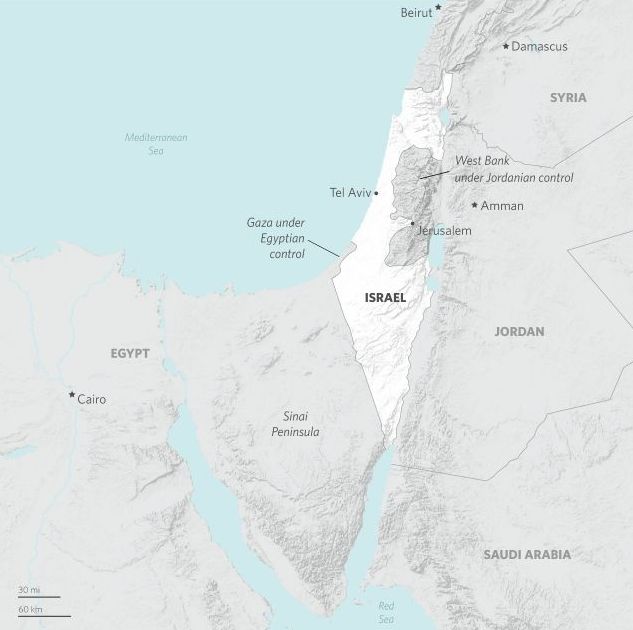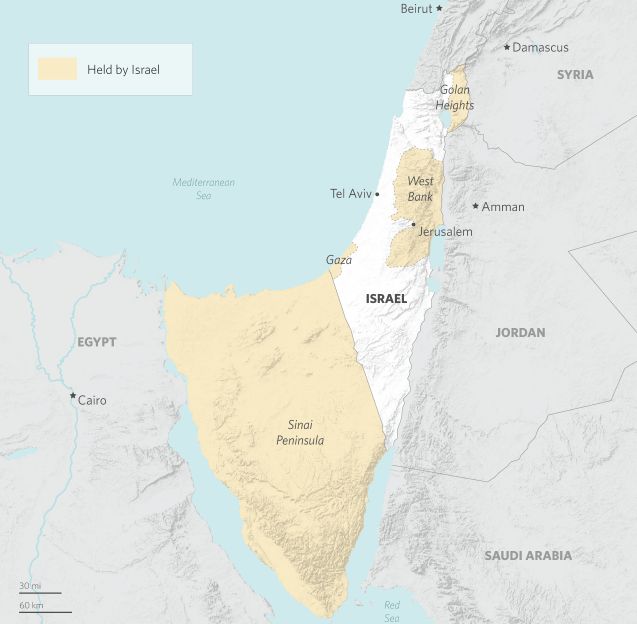The decades-long conflict between the Israelis and Palestinians has long
commanded international attention and support for the opposing sides. Through
the years, the dispute has galvanized the Arab nations of the Middle East and
North Africa against the Israeli state. But over time, as tentative peace
agreements have taken effect and unrest, and instability have overwhelmed much
of the Arab world, the conflict has slipped out of the regional and
international spotlight. This waning attention, combined with the
irreconcilable differences between the two sides of the conflict, and within
them, will keep a resolution at bay in the coming year. At the same time, though
fractious and unpredictable, the conflict is unlikely to expand. Instead, the
new year will bring more of the same for Israel and the Palestinian Authority,
including the perennial risk of another flare-up.
While earlier we looked at the geostrategic problems
of Israel, in the case of the Palestinians the story begins with the Ottoman
Empire, which controlled the Middle East from 1517 to 1918, when World War I
ended. The Ottomans divided the Middle East into provinces, one of which was
Syria. Under the Ottomans, the Syria province encompassed what is today Syria,
Lebanon, Jordan and Israel. Constantinople (Istanbul), the Ottoman seat, sided
with the Germans in World War I. As a result, after the war the victorious
British and French dismantled the Ottoman Empire, and the province of Syria
came under British and French rule. Under a secret wartime French-British deal,
known as the Sykes-Picot agreement, the province was divided on a line running
from Mount Hermon due west to the sea. The area
to the north was placed under French control.
It is ironic that after the Paris
Peace Conference in 1919, another Paris conference this time about the Israeli and Palestinian dispute is about to take place.
Abbreviated
Timeline of Israel-Palestine Territory Change and Conflict

But already, the conference has failed in its principal endeavor to coax
the two sides of the conflict into the same room to discuss the situation.
Prominent Israeli and Palestinian leaders have yet to confirm their attendance.
1948-1949:
Israel Declares Independence After the British Give up Control of Palestine

Occupying the territory between the borders established after the 1948
Arab-Israeli war and those drawn after 1967's Six-Day War is part of Israel's
defensive strategy.
1967: Israel Annexes Territory

The Palestinian Authority, meanwhile, lacks a government coherent enough
to agree on a solution to present to Israel. The two most prominent Palestinian
political parties, Fatah and Hamas, envision entirely different outcomes for
the enduring struggle. Fatah's two-state solution is far too conciliatory for
Hamas, which espouses violent opposition to Israel. Since Hamas swept elections
in 2006, deep divisions have all but hamstrung the Palestinian government. The
discord between Hamas and Fatah grew to such an extent in 2016, despite their
attempted peace agreement, that it derailed scheduled elections. To further
complicate matters, the Palestinian Authority is at loggerheads over a
succession plan for aging (and often ailing) leader Mahmoud Abbas.
1975-1982: Israel Withdraws From Sinai

Though Israel's borders and settlements have commanded international
attention, they are internal issues that only the Israeli government has the
power to address. Similarly, they will not prevent Palestinians from launching
retaliatory attacks against the perceived Israeli occupation.

Solutions to the conflict's security and refugee crises will prove
elusive. Palestinian terrorist attacks are still a pressing concern for Israel,
but more and more, the Islamic State and other jihadist groups are competing
for the country's attention. And because Hezbollah currently wields more
political and military power than Hamas does, Israel is devoting much of its
offensive capabilities to countering that organization instead.
A Change in US Policy
As the peace process continues to flounder, Donald Trump is preparing to
assume the U.S. presidency. Trump and his pick for the new U.S. ambassador to
Israel have criticized President Barack Obama's stance toward the country and
pledged to increase their support for Israel and its activities in the West
Bank. If the Trump administration follows through on its promise to move the U.S. Embassy in Israel
from Tel Aviv to Jerusalem, he risks provoking a backlash from Middle Eastern
countries that support the Palestinian Authority.
But for countries such as Saudi Arabia and Turkey, Israel is a tacit
ally in their efforts to counter Iran's influence in the region. (Turkey is
also pursuing energy ties with Israel in the eastern Mediterranean.) Egypt,
meanwhile, must work to preserve peace in the Palestinian Authority under its
agreements with Israel or else risk losing vital economic and security
assistance from the United States. Though Jordan has already spoken out against
the proposed embassy relocation, its dependence on U.S. financial and military
support will limit its criticism. Public outcry in these countries over Trump's
policies toward Israel could prompt their leaders to take a tougher stance.
Still, maintaining an alliance with Israel — either to keep Iran in check or,
for Jordan and Egypt, to stave off instability at their borders — is more
important for these governments.
9 Dec. 2017: While the UN security
council is to meet in order to discuss the US decision to Jerusalem as Israel's
capital, here an analysis of the Jerusalem problem and the two-state solution
option. Jerusalem
Unveiled.
For updates
click homepage here